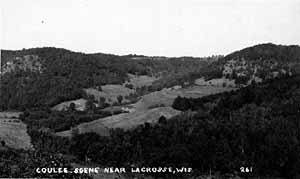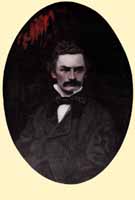


 |
  |
|

ECONOMIC pressure generally results in legislation. If an automobile were driven wildly upon a prairie and neither harmed nor killed any one, there would be no necessity for restrictive legislation. It has been possible for the doctrine of industrial freedom to exist in America for a similar reason. No one demands laws restricting the rights of others in the use of land or minerals when there is an abundance of both. It is only when men touch elbows that laws which narrow and define human freedom come into being. A new country requires capital, and capitalists must have inducements in the form of tremendous gain in order to assume the risk. In a new country, capital is a goddess to be propitiated. It is somewhat surprising, therefore, that the doctrine of the power of the state should spring up in Wisconsin, which in 1900 produced more lumber than any other state in the country. One would scarcely expect that legislation of a type which would lead one to think that its makers believed with Professor Schmoller that the state is "the grandest existing ethical institution" would gain a stronghold in such a community.
It is strange that, notwithstanding all the battles, the constructive legislation growing out of these conditions was of such an orderly character, so lacking in danger to prosperity and so harmonious with the social development of the state. The leaders deserve our commendation because they realized the necessity for this thorough, painstaking construction. Fortunately for them, the character of the people was such that it constituted an element contributing to the advancement of their plans.
 Carl Schurz |
Wisconsin is fundamentally a German state: the Germans were the first to arrive in significant numbers, although they were followed later by a large influx of Norwegians. Both of these peoples from the great Teutonic branches have been noted for their steadfast love of liberty and the systematic way in which they proceed with government. The "forty-eight" Germans, those of the Carl Schurz type, came fresh from a struggle for liberty in the old country, and brought with them as high ideals as any people who ever came to America. Under these influences, the farms of Wisconsin were settled and an orderly, careful government established. A New England stream arriving about the same time brought with it high educational ideals, which endowed the whole Northwest with colleges and institutions of learning. It was under these auspices that the University of Wisconsin was founded, having indelibly impressed upon it a certain distinction which it has never ceased to have, and certain ideals of service which can be found in no other universities to-day, except perhaps in Germany. |
A page from the directory of the officers and students in the University of Wisconsin. Note the German and Scandinavian stock!
Knott, Rodney D., Eau Claire, A Mid 1--4445
Knotts, Frank, Gary, Ind., E 1--3683
Knox, Flora R., Milwaukee, L S 4--307
Knudson, Barney, Algoma, E 1--1611
Knudson, Jeanette L., Madison, L S 4--1797
Knutson, Martin H., Ridgeway, A 32811
Koch, Harry J., Davenport, Ia., C C 13982
Koch, Orville C., Plymouth, C C 23187
Koch, Oswald T., Osceola, L S 44529
Koch, Vincent W., Janesville, L S 3 Med 1--197
Koehler, Jennie E., Menomonee Falls, H Econ 22560
Koehsel, Minnie C., Madison, L S 3--547
Koenig, Alfred E., Madison, L S Grad--1026
Koenig, Ruby E., Two Rivers, L 2
Koepke, William C., Waukesha, Nor C 3
Koester, George F., Chicago, III., L S 2178
Kohl, Edwin P., Marshfield, L S 31141
Kohler, Bert M., Chicago, III., L S 3744
Kolls, Alfred C., La Crosse, L S 3 Med 1--805
Koltes, Raphael P., Waunakee, L S 22672
Kolinsky, Pete C., Racine, L S 4 L 12864
König, Selma S., Weyauwega, L S 4--4004
Kootz, Arthur C., Milwaukee, L S 2186
Korst, Philip B., Janesville, M E 32999
Kottnauer, Edwin H., Milwaukee, Ch E Ad Sp 2
Kouns, Sarah M., Upper Sandusky, O., L S 21488
Kowyowundjian, Garabet, Racine, E 1
Kozarek, Steven A., Antigo, C E 42257
Kraemer, Edward C. A., Milwaukee, A 1
Kragh, Stella M., Madison, L S 42923
Kratz, Clara, Schleisingerville, M 32737
Krause, Emil F., Sawyer, E 1
Krause, Linnie, Ridgeland, L S 4
Kraus, Raymond J., Marshfield, E E 3--3036
Kreis, Elizabeth, Wheaton, III., L S I--156
Krell, Samuel A., Madison, C E 4 Adv C--4779
Kremer, Eugene E., Fond du Lac, L S 4--2864
Kremers, Roland E., Madison, L S 1
It is significant that among the first regents of the university was Carl Schurz, the great hater of bad government, the enthusiastic, patriotic statesman, the powerful champion of civil service. Instituted as it was by these liberty-loving people, it is not strange that the university should have had as one of its great presidents, John Bascom, a man of the highest type of New England character. Bascom was an economist; he was more than an economist. Political economy to him was not a dismal science; it was a science by means of which order, morality and statesmanship could live; it had a moral force.
He declared "that, while the laws of legitimate acquisition look to the good of all, and not to the plunder of any, any illegitimate action which violates a higher, a moral law, will usually violate a lower, an economic law, and measure the gains of one by the losses of another. There is a harmony of productive action by which the gains of all are secured, and the laws of this harmony are those of Political Economy. Intimately connected with this view, is that by which the harmony of the lower laws of acquisition with the higher laws of morals is seen, and the mutual strength which they lend to each other. The state of highest production not only may be, but must be, the state of highest intelligence and virtue; and the highest intelligence and virtue cannot fail to be productive of the greatest wealth. The interests of production are often seen to be so parallel with the path of virtue, as to be more provocative of virtue than virtue herself. The admirable interaction of the laws of the several departments of man's social nature, the mutual support which they render each other, and the general concurrence of their motives, present topics not less suggestive of divine skill than those of the external world." He taught, he philosophized, and he left a deep impression upon this state and upon the university. In his classes were men like Senator Robert M. La Follette, Judge Robert G. Siebecker of the Wisconsin supreme court, and Charles R. Van Hise, now president of the University of Wisconsin.
On December 13, 1911, memorial services were held for this man at the university. The full tide of his influence was clearly shown at that time, the beginnings of which Bascom himself had lived to see. The following tributes paid to his memory show the respect for and appreciation of his work and influence.
Said Judge Siebecker on that occasion:--
"He held to the principle that we are bound in duty to use the school as a means of helpfulness in the world and that every true educational principle takes issue with any system of instruction that omits to call upon the school to take its place in the state as a constructive agency in the highest social economy."
Dean E. A. Birge said:--
"I question whether the history of any commonwealth can show so intimate a relation between the forces which have governed its social development and the principles expounded from a teacher's desk, as that which exists between Wisconsin and the classroom of John Bascom. No social and political movement is even in part the work of one man or one set of men, and no one who knows the history of Wisconsin can be ignorant that the state was fully alive to the need of economic reform before Dr. Bascom came here, and that it was ready to attempt to put such reform into practice. But it is equally true that no social influence in Wisconsin during the past generation has been more potent than that of Dr. Bascom--all the more potent during the quarter of a century in which it has been silent. The social movement of the state has been rapid, sane and just, an unusual and rare combination of qualities. Among the foremost influences that have secured these qualities are those radiating from Dr. Bascom's classroom, appealing first to his immediate students; less immediately, but still directly, to the many students of the university who did not get to his classroom, and through all these affecting the temper of the people of the state."
Strange as it may seem, the same philosophy which was being taught in the University of Wisconsin was slowly becoming the dominating influence in Germany. The strength of this theory, even in remote times, is clearly shown in the writings of early German economists. The belief that it pays the state to concern itself in the betterment of human beings and the protection of human welfare, in order that it may receive in return a rich reward from this investment, is not a new one.
While Germany, shattered by the Napoleonic wars, was striving to solve her problems through methodical development under the iron hand of Bismarck, Wisconsin, the great German state of this nation, was slowly forming, through the university and its teachers, certain ideals which in the future were to have a marked effect upon its legislation. In Germany the scholar was recognized and respected as a leader; in the German universities the lamp of liberty was ever kept burning brightly. It was to the German scholar that Bismarck invariably turned for aid in the development of the legislation which has characterized Germany for so many years past--the legislation which built it up from a country of poor peasants to a great nation, second to none in the prosperity and the happiness of its people. While this German movement, with its practical system of economics, was slowly growing and developing in its universities, other economic and political ideals had dominated England and were transplanted to America. Even before the time of Napoleon, there had dawned in England the philosophy of laissez faire. The history of its expansion through the school of Adam Smith and John Stuart Mill, every schoolboy knows. The idea in it of independence and personal and industrial liberty suited our American spirit. The concept that the state should have nothing to do with the affairs of men, that the state was a necessary evil, that men do best when left alone, appealed to the men of America, as it did to the immigrants, who rushed to our ports from the countries of Europe, land-hungry and sickened by the laws which had bound them in the old country. It was not strange that the doctrine of industrial liberty took deep root in America and found its way into our law and into the teachings of our professors. While the able and inspiring Professor William G. Sumner, the teacher of President Taft and of State Senator John M. Whitehead, the great opponent of La Follette, was expounding this philosophy in no uncertain phrases at Yale, while the eastern colleges were everywhere satisfied, both in the law schools and in the courses of political economy, with this doctrine of industrial liberty, there was being evolved in Wisconsin under German influences a new doctrine which did not take form save in humane ways, until after its teacher had ceased his activities. But John Bascom and his economic teaching were not forgotten; nor were Carl Schurz and his political ideals forgotten.
In Germany, prosperity had not resulted immediately from the efforts of her economists, and the Germans, fleeing from the poverty of the old country and arriving on our shores by the hundreds of thousands, were slow to realize the mighty forces at work which were destined to stop that tide and show to all men the wisdom of the new doctrine of the judicious interference of the state.
When Sumner was in his prime and the eastern colleges were dominated by his great mental strength and the clearness and force of his lectures and writings, a student left Columbia university and went to Germany to study under Carl Knies and Wagner; there he absorbed the inspiration of New Germany. He saw an empire being fashioned by men regarded in his own country as merely theorists; he realized that these Germans were more than mere theorists; that they studied the problem of human welfare; that they were laying the foundations for a great insurance system; that they foresaw the commercial prosperity of the country built upon the happiness, education and well-being of the human units of the empire; that order, intelligence, care and thought could be exercised by the state. Imbued with inspiration by these great teachers, this young man returned to America. He walked the streets to obtain employment as a teacher, and after nearly starving, was engaged by a kind Jew as tutor to his children. Finally, after many vicissitudes, he became an instructor at Johns Hopkins university. Gradually the country began to understand that a new teacher had appeared in America. Books on economics were issued which actually seemed to deny the old "wages fund" doctrine and the theories of value which were promised by the economist in England and in this country. In fact, many thought that what he wrote was not political economy at all; they did not recognize it as such. His books and his articles began to attract attention, probably because people began to feel, in a vague way, that something was wrong with our philosophy.
The captains of industry held sway in our country, the great trusts began domineering our political life, the country began to be more crowded, periods of depression came oftener, and the old doctrine, advocated by Sumner--that the state should not interfere with industrial life--was not altogether satisfactory. A group of thinkers began to follow the leadership of this man. Richard T. Ely finally came to the University of Wisconsin as a professor of economics. Here was another singular coincidence. The pupil of Knies and Wagner, coming from Germany with his German political ideals, succeeded Bascom as a teacher of political economy in the German university of the German state of Wisconsin. A curious condition surely! He was regarded as a socialist, and before long was tried by the regents of the University of Wisconsin as a socialist. After great excitement, which is still remembered throughout the state, he was acquitted, and the regents in acquitting him gave forth the following statement:--
"In all lines of investigation . . . the investigator should be absolutely free to follow the paths of truth, wherever they may lead. Whatever may be the limitations which trammel inquiry elsewhere, we believe the great state of Wisconsin should ever encourage that continual and fearless sifting and winnowing by which alone the truth can be found."
Hence it is not surprising that in the republican platform for 1910 after the University of Wisconsin had gone through a trying siege in which its professors were again accused of being socialists and of "interfering in politics," that a political party, dominated by a student of Bascom's, and having in it many of the students of Ely, should have repeated word for word the same phrases which were written seventeen years previous, nor that the class of 1910 should have presented a tablet to the University of Wisconsin, inscribing upon it the following portion of that acquittal:--
"Whatever may be the limitations which trammel inquiry elsewhere, we believe that the great state of Wisconsin should ever encourage that continual and fearless sifting and winnowing by which alone the truth can be found."
Thus succeeding Bascom and Ely came a long line of young men, many of them of German or Scandinavian stock, who were impressed with the ideas that Ely expounded at that time. He preached a curious new doctrine, a "new individualism," that men deserved the right of opportunity and benefited by it; that it was the duty of the state to preserve to them opportunities; that the state was a necessary good and not a necessary evil; that the great institution of private property was good, and furthermore existed for public good, but that if any particular part of it did not exist for public good, it should be made to do so. He was practically the organizer of the American economic association. The principles he laid down have extended over the country and are being taught in all the principal colleges; his pupils have inspired men who have taught others. He has gathered about him in the University of Wisconsin a group of men who have studied with him and received inspiration from him. At a recent meeting of the American economic association it was found that there were present seventy professors or instructors in colleges who at some time in their career had been his pupils.
The doctrine that the state should have more to do with economic welfare had spread throughout the entire country, but in no place had it found better soil nor had greater results than in the German state of Wisconsin. German professors have come repeatedly to Wisconsin and have been surprised by the German spirit in the university. Therefore it is only natural that the legislation of Wisconsin should receive an impetus from men who believe that laws can be so constructed as to lead to progress and at the same time preserve to the fullest all human betterment; that the advice of scholars may be sought; that what has made Germany happy and prosperous may be duplicated in America; that business and human welfare can increase side by side and that the best investment which the state can make is that which makes every home better, for when intelligence goes into the product, that product will win out in the race for the commercial supremacy of the world. If Wisconsin is a prosperous state to-day, there is no doubt that it is largely because of German ideas and ideals, early instituted in the state.
The Scandinavian element came later, but was animated by the very same ideals. Indeed, they became stimulated in many cases before they came to Wisconsin. Every Norwegian, Swede or Dane who pays a visit to-day to the Scandinavian countries returns an easy convert to the ideals which seem to have dominated Wisconsin during the last decade or more. Many of the leaders are found among the Scandinavians. Many important posts, influential in the guidance of the different commissions, are filled by men who have traditions from the old countries. It is worthy of comment that a Scandinavian statistician was responsible for the detailed statistical work of the railroad commission and that another gifted man of Norwegian stock has been the chief means of promoting splendid insurance laws in this state. The Norwegian element is much more active than the German in politics; it is much more aggressive. For many years one of the most talented members of the tax commission has been of that race, and it is not unusual in the legislative body to hear Norwegians, Danes or Swedes quote in debate the high standards maintained in Norway or in the Scandinavian countries. Men familiar with foreign agricultural methods and those trained in the people's high schools of Denmark or in the scientific schools of Sweden or Norway are helping to organize county agricultural schools. Behind this Wisconsin movement is a great body of tradition, a tradition of orderliness and of scientific methods, a knowledge that things can and should be done by experts in a careful and diligent manner and that progress must come, slowly but thoroughly.
If we are going to understand Wisconsin legislation, we must fully realize that the leaders of it could not be agitators of the type which is seen frequently in other parts of the country. However radical their ideas may have been, however original their methods, it was inevitable that legislation should be constructed slowly and cautiously. The men who have had the greatest influence in making that legislation what it is, were inspired by these ideals. The people of Wisconsin would not have supported any wild or extravagant legislative schemes. The stock is too sturdy, too cautious and too conservative to be swayed by any revolutionary influence. The leaders had a stubborn, determined people with whom to deal. They were slow to move, as they are to-day, and it took long patience and fighting to win them, but once moved, they "stayed put."
It must be remembered that there have been those who believed in the social or educational features, who wavered or halted in the long fight because of certain political legislation hereafter described. There have been some who opposed the political changes, but who are now seemingly acquiescing or even actually approving because of what seems to be fairly good and sane results from the last decade of political innovation and economic regulation.